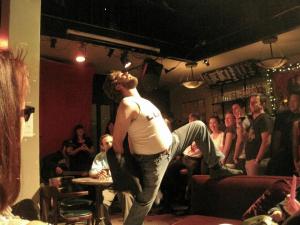Stuart Bousel, who moonlights once a year as the San Francisco Fringe Hospitality Coordinator, gives us a sneak peak at this year’s Fringe Festival.
On Saturday, following a picnic with former Theater Pub AD Julia Heitner (who was in town for the weekend) I headed over to the EXIT Theatre for the first event of this year’s Fringe Festival.
In case you don’t know anything about the Fringe or fringe festivals in general (which seems unlikely, if you read this blog), the San Francisco Fringe Festival is the second oldest/longest running fringe festival in the United States (23 years), and is a variation on the world’s most famous fringe festival, which was started in Edinburgh, Scotland, and is widely considered the largest annual arts event on the planet. Though the term fringe theater has come to mean “non-mainstream”, at a good fringe festival you’ll find almost everything represented, from classical works to performance art, to music acts and dance troupes, to world premieres of new plays and musicals. Over the years a number of shows we now think of as mainstream actually had their premieres at a fringe festival, and the number of actors, performers, artists, writers, directors, dancers, musicians, acrobats, clowns, magicians and whatever-else-you-can-think-of who have passed through a fringe festival somewhere, one way or another, is incalculable. I myself performed in a fringe play during my first year in San Francisco- a little musical about a gay baseball player called “The Seventh Game of the World Series” by poet (and avid baseball fan) David Hadbawnik.
One of the best (and worst, depending on your perspective) things about the SF Fringe is that EXIT Theatre artistic director Christina Augello has kept the festival un-curated, and every year would-be participants must submit applications which are then thrown into a hat. At the annual Fringe Lottery, projects are pulled from the hat randomly before a live audience, and once the 35 available slots of the festival are filled the program is set. The beauty of this is an annual theater festival with local, national and international participants, that is entirely uncensored and devoid of theater politics. The downside is that quality control is virtually nonexistent. Then again, since quality really is in the eye of the beholder, of all the evils a festival might have, this one strikes me as the least, and considering all the other ways the SF Fringe sets the bar for fringe festivals (for instance, performers keep all of their box office), I’ve come to not only accept but embrace the less palatable aspects of the theater roulette that is seeing shows at the Fringe. As an environment intended for experimentation and risk, whatever that means to the performer whose work you are seeing, there is bound to be some mistakes, half-baked ideas, or just work that is still finding its way or its audience. That said, sometimes seeing a terrible show at the fringe is also like scoring a jackpot, as every year there is usually at least one show so bad it passes into legend. Depending on who you ask, the show I was in back in 2003 was one of those shows. Last year there were two, and we’re still talking about them.
On Saturday, festival staff, volunteers, performers and long-time patrons/fans assembled at the EXIT for free pizza and a sneak peak of 7 shows that will be playing at this year’s Fringe. I have to say, over all, it looks like there’s some really strong work this year, and nothing seems, at first glance, especially disastrous. Susan Fairbrook over at Play by Play has already done an excellent survey of what’s on the boards this year (including a shout-out to work by former Theater Pub Founding AD Bennett Fisher), but I figured as the Hospitality Coordinator for the Fringe (read: guy running the craft-services lounge/guest services desk) and a long-time Fringe audience member and staffer, I’d pass on my recommendations based on the preview, and also my ever-sharpening ability to call ahead of time what’s going to be especially good (which pales in comparison to the mad skilz of Fringe Tech Director Amanda Ortmayer).
Mandarin Orange by Kate Robards, directed by Jill Vice
There are a lot of one-woman shows at the Fringe (last year I saw four of them and that wasn’t even half) and so it struck me as appropriate to begin there, and this was actually the first preview of the evening as well. Kate Robards’ piece is a memoir of her life as an ex-pat in Shanghai, China and the contrast between that and growing up in small-town Texas, USA. As a guy from the semi-rural portion of Tucson, Arizona, I found Robards’s choice to set the scene with a piece of ridiculous local news (“Man’s Penis Lodged In Vacuum Cleaner!”) pretty spot on, but things got much more interesting during her portrayal of the circle of female ex-pats who take her under their wing upon her arrival in Shanghai. With each woman, Robards demonstrated a keen eye for detail, both in the material and the physicalization/vocalization of who these women were and what had brought them, and kept them, in China. Playing both sides of a conversation is always hard to pull off, and is the Achilles heel of most solo shows, but Robards jumped feet first into a group discussion and her ability to move back and forth between all five participants was expert and elegant. The subject matter of the show doesn’t seem to be particularly new, but Kate’s spin on it certainly seems fresh, and with China becoming more and more of an international presence once again I suspect it will spark some interesting conversations.
My Body Love Story by Dominika Bednarska
Speaking of one-woman shows- here’s another. Dominika Bednarska is a queer disabled femme whose press release boasts “rhinestones, storytelling, dancing and many laughs” but if the snippet on Saturday, double entendre of the title, and remark in the press release about “the body and self trying to get along” aren’t just red herrings, I suspect it will mostly be a show about disabled queer youth trying to get laid. Similar to Kate Robard’s show in that it’s based on the author’s experiences, Bednarska’s approach (from what I saw) seems to be less theatrical and more discursive, with her telling the stories rather than impersonating the participants- something that works beautifully because Bednarska is a delightful storyteller, laughing along with her own absurdities and daring you not to laugh with her. Simultaneously coy and bold in revealing the details of her sex life, she challenges not only conventional ideas about female storytellers and their stories, but conventional ideas about disabled youth, presenting them as horny, insecure, awkward, and basically ordinary young people pre-occupied with the usual woes of who will love me/want me/fuck me when I’m such a mess of problems/fears/on-going inner dialogues. To say it was refreshing doesn’t do it justice; of all the pieces presented on Saturday, it was the one I found most inspiring.
Genie And Audrey’s Dream Show! by Genie Cartier and Audrey Spinazola
Keeping with the female performer theme but moving into the two-hander fusion show, this circus comedy about two friends is a return from last year and won the Stuart Excellence In Bay Area Theater Award in 2013 for “Best Chemistry.” You can read all about that here, and if that doesn’t convince you to see the show this year, I don’t know what will (except maybe this delightful account of how the show came together). For those of you who have already seen the show, it’s been touring around the country and growing and shifting, so seeing it again should be a whole new experience in and of itself as Audrey and Genie’s victory lap will no doubt be older, wiser, and better. Even if it’s exactly the same, though, there’s no other show like it, so you won’t want to miss it and I would definitely recommend getting tickets ahead of time.
An Awkward Sensation by Kurt Bodden and Allison Daniel
Rounding out my recommends is another two hander that combines elements from many different styles of performance. Kurt Bodden also won a SEBATA last year (for “Best Solo Show”) but that is the least of the accolades that have been deservedly showered on him over the years. Performance partner Allison Daniel is held in equitably high esteem for her puppetry skills, but like Genie and Audrey, what makes this show work is the chemistry between them. Also gifted with impeccable timing, their five minutes on Saturday was perhaps the most astonishing to watch as it veered from comedy (Allison as a crime-fighting cat easily distracted by Kurt’s laser pointer) to pathos (Allison turning a coat and hat into a strangely sympathetic puppet that silently asks to be carried by Kurt) and contained within that stretch a wealth of other emotions. Somewhere between sketch and performance art, I’m probably most intrigued by this piece, both by what other surprises it might contain and in what directions these two obviously adept performers would and could go. Plus that puppet bit will make my boyfriend cry, and that’s enough of a reason to go see anything.
Speaking of Cody Rishell, if you didn’t have enough reasons to come down to the Fringe this year, the Green Room (where I and my amazing band of volunteers will be dispensing snacks and information) will once again have his art on display. This year it will be a retrospective on Clyde The Cyclops, who just had his first birthday. Never will those walls have been cuter, so how can you miss out on that?
Stuart Bousel is one of the Founding Artistic Directors of the San Francisco Theater Pub and editor-in-chief of this blog. You can find out more about him at www.horrorunspeakable.com.


